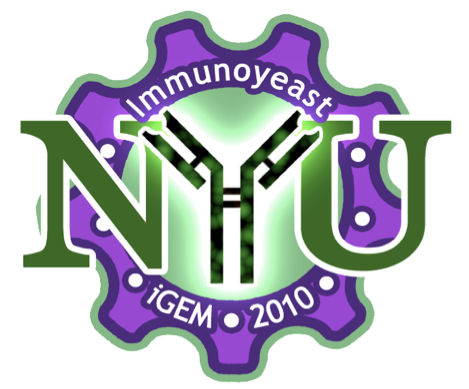Team:NYU/Parts
From 2010.igem.org
| Line 18: | Line 18: | ||
2. Yeast strains are more rarely used in iGEM projects but contain certain parameters that are ideal for certain projects. Because there are far fewer yeast biobricks in the Registry, we wanted to biobrick yeast parts that would be easy to use and possess some functionality useful for future projects. | 2. Yeast strains are more rarely used in iGEM projects but contain certain parameters that are ideal for certain projects. Because there are far fewer yeast biobricks in the Registry, we wanted to biobrick yeast parts that would be easy to use and possess some functionality useful for future projects. | ||
| - | 2a. Aga2 - When the Aga2 protein is fused to a part of interest, the fusion is secreted and Aga2 complexes with a protein on the cellular surface - leaving the part of interest displayed on the surface of the cell. While we did not end up using this part in our official construct, | + | 2a. Aga2 - When the Aga2 protein is fused to a part of interest, the fusion is secreted and Aga2 complexes with a protein on the cellular surface - leaving the part of interest displayed on the surface of the cell. While we did not end up using this part in our official construct, biobricking it from a plasmid we already had in our lab will surely benefit future teams. |
| + | 2b. Aga2+Linker - Because most everyone will want a linker attached to the Aga2 protein, we went ahead and submitted this construct as well. | ||
| + | 2c. Secretion Tag - Another 'yeast functional tag', the secretion tag does just what you think when fused to the C terminus of a protein of interest. | ||
3. To construct and submit certain ubiquitously useful biobricks that we would be using. | 3. To construct and submit certain ubiquitously useful biobricks that we would be using. | ||
Revision as of 21:31, 18 August 2010
| Home | Team | Project | BioBricks | Modeling | Notebook | Safety |
|---|
| We went in to the competition with certain goals for the parts we would make. Incorporating these goals with the 'Quality not Quantity' mantra, we decided to highlight certain areas of advancement that we believe future researchers would like to see in the registry.
1. To improve parts already in the registry by lessening the constrictions on their use and making them more adaptable. 1a. 36bp LoxP site - the naturally-occuring substrate for the Cre recombinase, a 34bp LoxP site, is not a multiple of three. When using this part in transcribed regions, previous teams had to either add or take away bases from surrounding parts to keep their systems in frame (sometimes unsuccessfully). To get around this restriction, we designed and Biobricked a 36bp LoxP site that does not contain a stop codon or other troublesome sequences. 2. Yeast strains are more rarely used in iGEM projects but contain certain parameters that are ideal for certain projects. Because there are far fewer yeast biobricks in the Registry, we wanted to biobrick yeast parts that would be easy to use and possess some functionality useful for future projects. 2a. Aga2 - When the Aga2 protein is fused to a part of interest, the fusion is secreted and Aga2 complexes with a protein on the cellular surface - leaving the part of interest displayed on the surface of the cell. While we did not end up using this part in our official construct, biobricking it from a plasmid we already had in our lab will surely benefit future teams. 2b. Aga2+Linker - Because most everyone will want a linker attached to the Aga2 protein, we went ahead and submitted this construct as well. 2c. Secretion Tag - Another 'yeast functional tag', the secretion tag does just what you think when fused to the C terminus of a protein of interest. 3. To construct and submit certain ubiquitously useful biobricks that we would be using. 3a. Flexible (Gly4Ser)3 peptide linker for use with most any peptide fusions
| |
|
Tell us more about your project. Give us background. Use this is the abstract of your project. Be descriptive but concise (1-2 paragraphs) | File:NYU team.png Your team picture |
| Team Example |
Parts
New for iGEM 2010 is the groupparts tag. This tag will generate a table with all of the parts that your team adds to your team sandbox. Note that if you want to document a part you need to document it on the [http://partsregistry.org Registry], not on your team wiki.
<groupparts>iGEM010 NYU</groupparts>
 "
"
